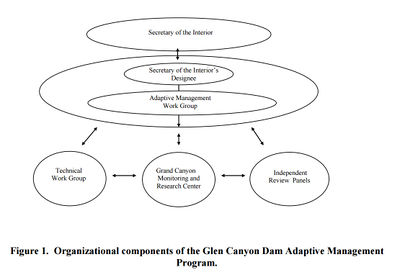Science Advisors
From Glen Canyon Dam AMP
Revision as of 10:53, 6 July 2018 by Cellsworth (Talk | contribs)
|
|
Science AdvisorsIndependent Review Panels, as called for in the Glen Canyon Dam Environmental Impact Statement (Reclamation 1995:38), are comprised of qualified individuals not otherwise participating in the long-term monitoring and research studies. The panels include peer reviewers, science advisors, and protocol evaluation panels whose primary responsibility is to assess the quality of research, monitoring, or science being conducted by the Adaptive Management Program and to make recommendations to improve it. Responsibilities of the panels include:
|
| Justification -- |
Scope -- |
Organization -- |
|---|
